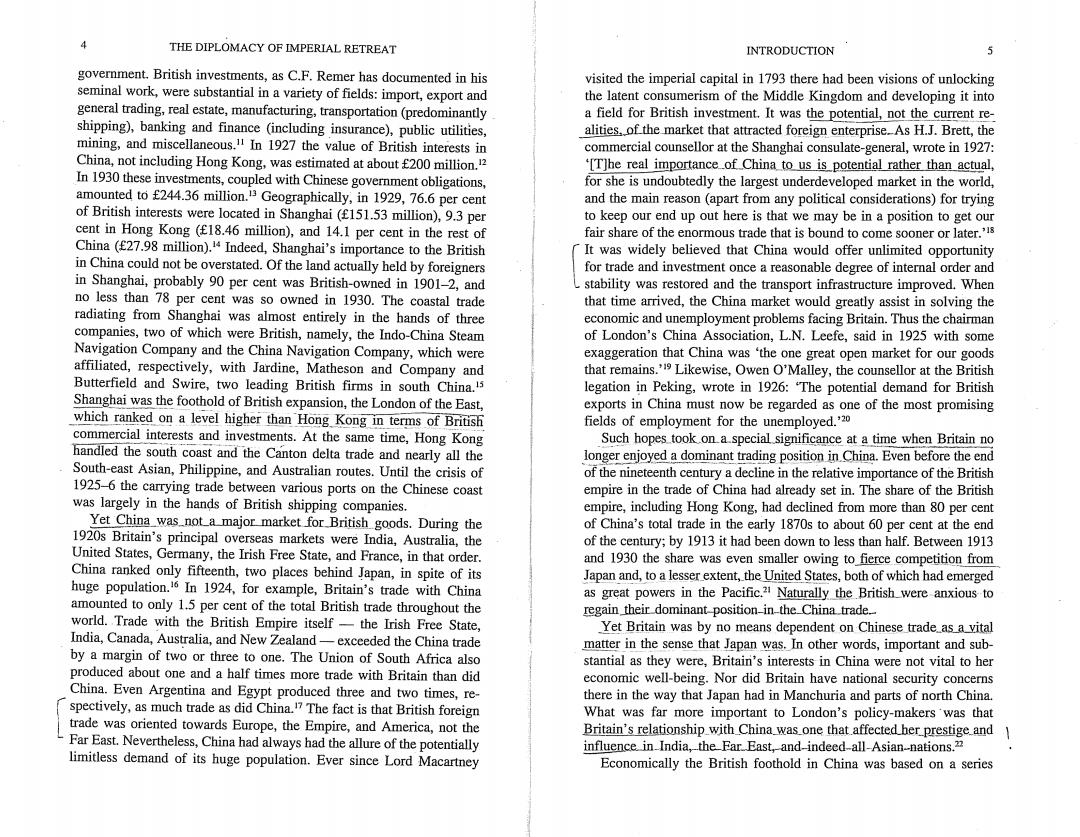正在加载图片...

THE DIPLOMACY OF IMPERIAL RETREAT INTRODUCTION 5 government.British investments,as C.F.Remer has documented in his visited the imperial capital in 1793 there had been visions of unlocking seminal work,were substantial in a variety of fields:import,export and the latent consumerism of the Middle Kingdom and developing it into general trading,real estate,manufacturing,transportation(predominantly a field for British investment.It was the potential,not the current re- shipping),banking and finance (including insurance),public utilities, alities,of the market that attracted foreign enterprise.As H.J.Brett,the mining,and miscellaneous.In 1927 the value of British interests in commercial counsellor at the Shanghai consulate-general,wrote in 1927: China,not including Hong Kong,was estimated at about E200 million.2 '[TJhe real importance of China to us is potential rather than actual, In 1930 these investments,coupled with Chinese government obligations, for she is undoubtedly the largest underdeveloped market in the world, amounted to E244.36 million.Geographically,in 1929,76.6 per cent and the main reason (apart from any political considerations)for trying of British interests were located in Shanghai(f151.53 million),9.3 per to keep our end up out here is that we may be in a position to get our cent in Hong Kong (f18.46 million),and 14.1 per cent in the rest of fair share of the enormous trade that is bound to come sooner or later. China (f27.98 million).14 Indeed,Shanghai's importance to the British It was widely believed that China would offer unlimited opportunity in China could not be overstated.Of the land actually held by foreigners for trade and investment once a reasonable degree of internal order and in Shanghai,probably 90 per cent was British-owned in 1901-2,and stability was restored and the transport infrastructure improved.When no less than 78 per cent was so owned in 1930.The coastal trade that time arrived,the China market would greatly assist in solving the radiating from Shanghai was almost entirely in the hands of three economic and unemployment problems facing Britain.Thus the chairman companies,two of which were British,namely,the Indo-China Steam of London's China Association,L.N.Leefe,said in 1925 with some Navigation Company and the China Navigation Company,which were exaggeration that China was 'the one great open market for our goods affiliated,respectively,with Jardine,Matheson and Company and that remains."Likewise,Owen O'Malley,the counsellor at the British Butterfield and Swire,two leading British firms in south China.5 legation in Peking,wrote in 1926:The potential demand for British Shanghai was the foothold of British expansion,the London of the East, exports in China must now be regarded as one of the most promising which ranked on a level higher than Hong Kong in terms of British fields of employment for the unemployed.'20 commercial interests and investments.At the same time,Hong Kong Such hopes took on a special significance at a time when Britain no handled the south coast and the Canton delta trade and nearly all the longer enjoyed a dominant trading position in China.Even before the end South-east Asian,Philippine,and Australian routes.Until the crisis of of the nineteenth century a decline in the relative importance of the British 1925-6 the carrying trade between various ports on the Chinese coast empire in the trade of China had already set in.The share of the British was largely in the hands of British shipping companies. empire,including Hong Kong,had declined from more than 80 per cent Yet China was_not_a major market for British goods.During the of China's total trade in the early 1870s to about 60 per cent at the end 1920s Britain's principal overseas markets were India,Australia,the of the century;by 1913 it had been down to less than half.Between 1913 United States,Germany,the Irish Free State,and France,in that order. and 1930 the share was even smaller owing to fierce competition from China ranked only fifteenth,two places behind Japan,in spite of its Japan and,to a lesser extent,the United States,both of which had emerged huge population.6 In 1924,for example,Britain's trade with China as great powers in the Pacific.2 Naturally the British were anxious to amounted to only 1.5 per cent of the total British trade throughout the regain their dominant position-in-the China trade. world.Trade with the British Empire itself-the Irish Free State, Yet Britain was by no means dependent on Chinese trade as a vital India,Canada,Australia,and New Zealand-exceeded the China trade matter in the sense that Japan was.In other words,important and sub- by a margin of two or three to one.The Union of South Africa also stantial as they were,Britain's interests in China were not vital to her produced about one and a half times more trade with Britain than did economic well-being.Nor did Britain have national security concerns China.Even Argentina and Egypt produced three and two times,re- there in the way that Japan had in Manchuria and parts of north China. spectively,as much trade as did China.7 The fact is that British foreign What was far more important to London's policy-makers'was that trade was oriented towards Europe,the Empire,and America,not the Britain's relationship with China was one that affected her prestige and Far East.Nevertheless,China had always had the allure of the potentially influence in-India,the Far East,and-indeed-all-Asian-nations.2 limitless demand of its huge population.Ever since Lord Macartney Economically the British foothold in China was based on a series